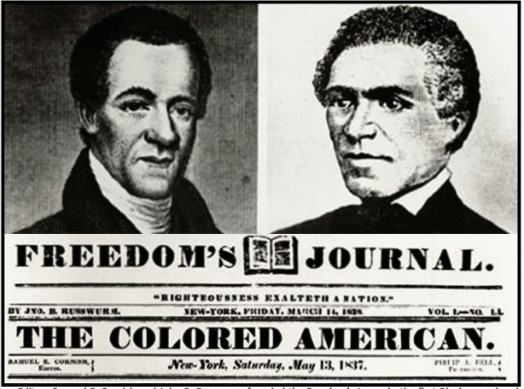
On March 16, 1827, John Brown Russwurm and Rev. Samuel Cornish published the first Black newspaper in the United States.
In 1827, a group of prominent free African American citizens from states along the Eastern seaboard met in the New York City home of Bostin Crummell to discuss means to communicate their views on the various social, political and economic issues that commonly confronted them and their respective communities. Although Black citizens utilized the church and social and fraternal organizations as a means of collective expression and dialogue, the usual channels of public media – particularly newspapers — were denied to them. Exacerbating the problem was the fact that elements of the established press routinely denigrated African Americans in print, even to the extent of questioning both the integrity and morality of the entire race.
The most significant outcome of the meeting at Mr. Crummell’s house in the winter of 1827 was the decision to begin publication of the first newspaper produced by Black Americans, Freedom’s Journal. Two attendees at the meeting, Rev. Samuel Cornish and John B. Russwurm, became the paper’s editors. Although well intentioned white citizens sometimes defended the honor of African Americans in public forums, the editors of Freedom’s Journal proclaimed in the first issue, “Too long have others spoken for us... We wish to plead our own cause.”
On March 16, 1827, the first Black newspaper in the United States was published. To commemorate this milestone, National Newspaper Publishers Association (NNPA), has designated March 16 “Black Press Day.”
since the appearance of Freedom’s Journal, the Black Press has chronicled and commented upon events as they have occurred and impacted upon African Americans. Throughout that time the Black Press has given voice to the struggles of African Americans as they have sought to overcome the effects of enslavement and discrimination to attain social equality – it has continued to “plead the cause.”
Over the years the list of contributors to the Black Press who have lent their talents as publishers, editors, journalists, columnists and cartoonists has included the greatest names in American history. Among them are Frederick Douglass, W.E.B. DuBois, Ida B. Wells Barnett, Langston Hughes, Romare Bearden, James Weldon Johnson, Mary McLeod Bethune and Daisy Bates.
In 1941, under the urging of John Sengstacke of the Chicago Defender, a meeting of leading Black publishers from across the nation was called in Chicago. Sengstacke said the meeting was designed for “harmonizing our energies in a common purpose for the benefit of Negro journalism.” At least one representative from 22 publications attended the meeting and the group decided to form the National Negro Publishers Association. In 1956, the trade association of the nation’s Black Press was renamed the National Newspaper Publishers Association.
Today, the NNPA is comprised of more than 200 Black newspapers in the U.S. and the Virgin Islands. NNPA newspapers have a combined readership of 15 million and the organization has forged ahead into the digital age with the creation of an electronic news service and the BlackPressUSA.com web site that enables the Black Press to provide real-time news and information to its national constituency.
Ways To Celebrate
• Read a Black newspaper
• Research the Black Press or a Black journalist
• Tweet “thank you” to a contemporary Black newspaper/journalist for maintaining the tradition and legacy of Black journalism
• Subscribe to and/or advertise with a Black newspaper
• Write an Op-Ed for a Black newspaper
• Teach your students or children about the history of the Black Press
• Watch Soldiers Without Swords
• Become a member of or advertise with National Newspaper Publishers Association
• Advocate for the accessibility and preservation of Black newspaper archives
• Friend or follow a Black newspaper on social media

